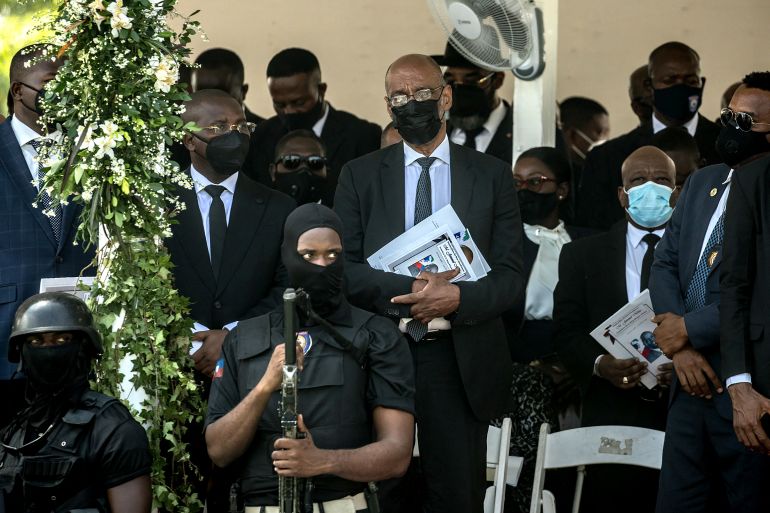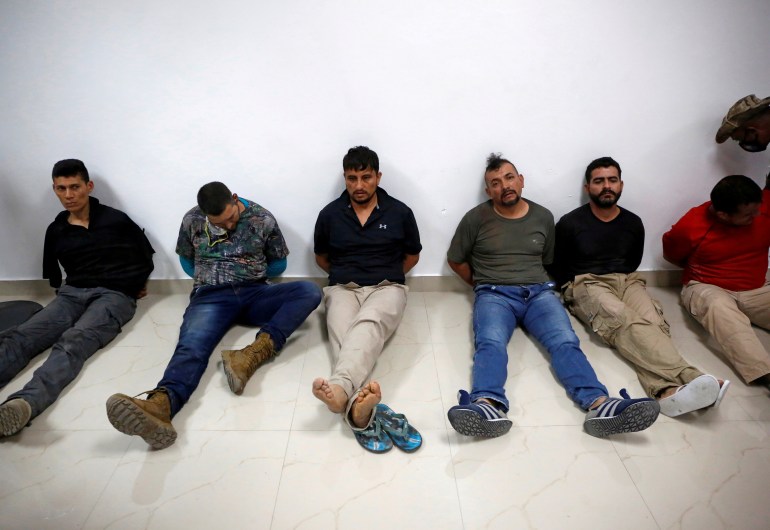Haiti crisis deepens after prime minister sacks prosecutor
Removal came hours after chief prosecutor named Prime Minister Ariel Henry as a suspect in the assassination of the country’s president.

Haiti’s political crisis has worsened after Prime Minister Ariel Henry on Tuesday sacked the chief public prosecutor who had accused him of links to the assassination of President Jovenel Moise on July 7.
Henry’s decision to fire prosecutor Bed-Ford Claude has exposed the infighting at the highest levels of what is left of Haiti’s government, more than two months after Moise was shot dead by assassins who stormed his private residence in the hills above Port-au-Prince.
Keep reading
list of 4 itemsHaiti PM rejects ‘diversionary tactics’ in Moise killing probe
Haiti prosecutors seek to interview PM over Jovenel Moise killing
Earthquake aid flowing after Haiti gang truce opens up highway
Claude was sacked hours after he asked the judge investigating Moise’s murder to charge the prime minister with involvement in the case.
“I have the pleasure of informing you that it was decided to terminate your post,” Henry told Claude in a publicly distributed letter.
Henry, a political moderate and neurosurgeon whom Moise named prime minister just days before his death in an attempt to reduce political tensions, has pledged to improve the country’s dire security situation and to organise long-delayed elections. He was formally appointed to the rule days after Moise’s assassination.
Claude said last week that phone records showed Henry had twice communicated with a man believed to be the mastermind behind Moise’s killing on the night of the crime.
That suspect, a former justice ministry official whom Henry has publicly defended, is now on the run.
Henry dismissed the prosecutor’s request to discuss the matter as politicking and did not respond to the allegations.
That prompted Claude to write on Tuesday to the judge overseeing the investigation into Moise’s murder and ask him to charge Henry as a suspect.
He also wrote to immigration telling them not to let Henry leave the country “due to serious presumption relative to the assassination of the president”.
Later on Tuesday, a letter from Henry to Claude dated September 13 emerged in which he said he was firing the prosecutor for a “grave administrative error”, without going into detail. In a separate letter dated September 14, he named Frantz Louis Juste to the post.
It remains unclear whether the order is valid as Haiti’s 1987 constitution mandates that the prosecutor can only be appointed or fired by the president, a position that remains vacant.
‘Grotesque’
Some legal experts expressed alarm at Claude’s requests for Henry to be questioned and charged, seeing the prosecutor’s move as an impediment to the independence of the judiciary.
Some in government circles had also called in recent days for the prime minister to resign over the allegations.
“These are grotesque and political acts,” Samuel Madistin, a lawyer for a human rights organisation, told the AFP news agency.
Decades of political instability, as well as natural catastrophes, have plagued Haiti’s development. Its aid-dependent economy is the poorest in the Americas, more than a third of Haitians face acute food insecurity, and gangs have turned swathes of the capital into no-go areas.
So far, 44 people – including 18 Colombians and two Americans of Haitian descent – have been arrested in connection with the inquiry into the assassination. None of the president’s security guards was injured in the attack.
“It’s an extremely convoluted state of affairs,” Michael Diebert, a journalist and author who has covered Haiti for more than 20 years, told Al Jazeera. “There’s a lot of doubt among people in Haiti about whether this investigation will be allowed to run its course. Most of the people who have been arrested so far, I don’t think anyone seriously thinks they were the money men or the real intellectual authors of this crime.”

Henry on Saturday criticised the earlier request for him to be questioned, saying: “These diversionary tactics, designed to create confusion and prevent justice from calmly running its course, will not stand.
“Those who are truly guilty, the masterminds of the odious assassination of President Jovenel Moise and those who ordered it, will be found, brought to justice and punished for their actions.”
On the same day, the prime minister announced that Haiti’s main political forces had reached an agreement to establish a transitional government until the holding of presidential elections and a referendum on whether to adopt a new constitution next year.
The agreement establishes a Council of Ministers under Henry’s leadership.